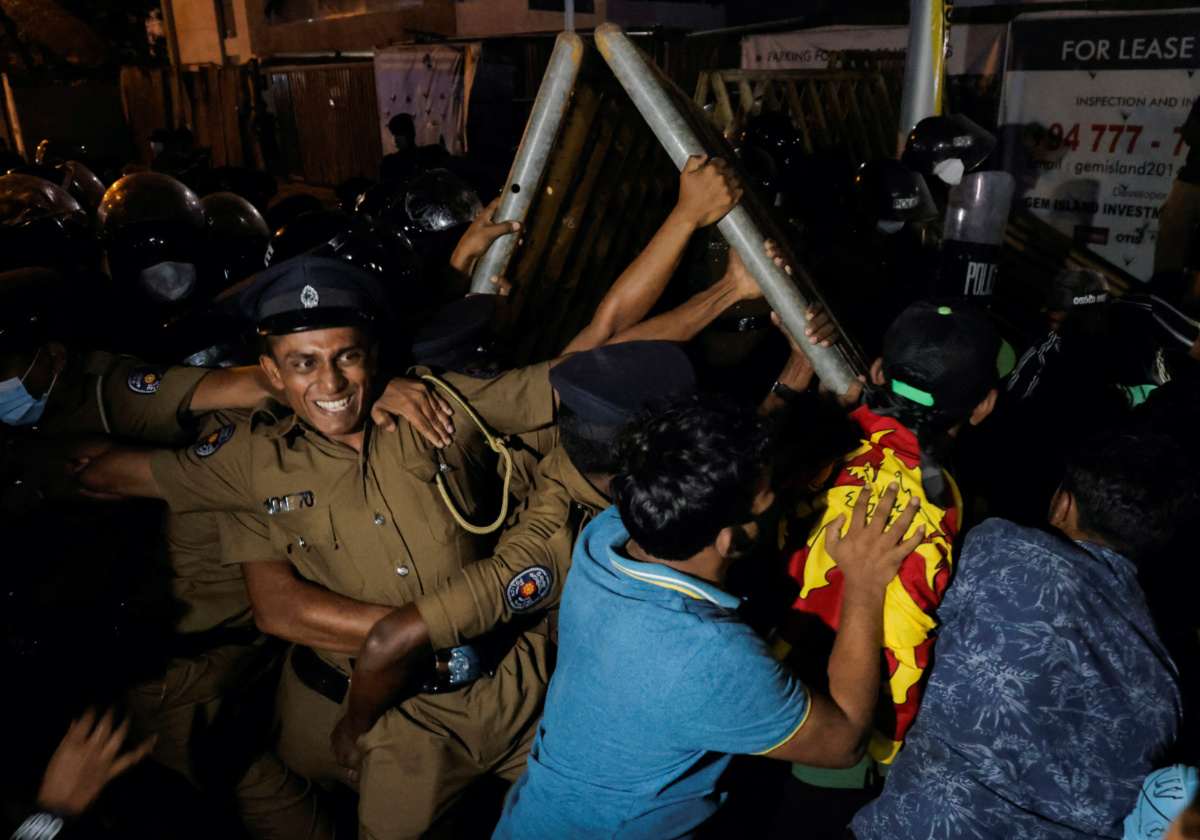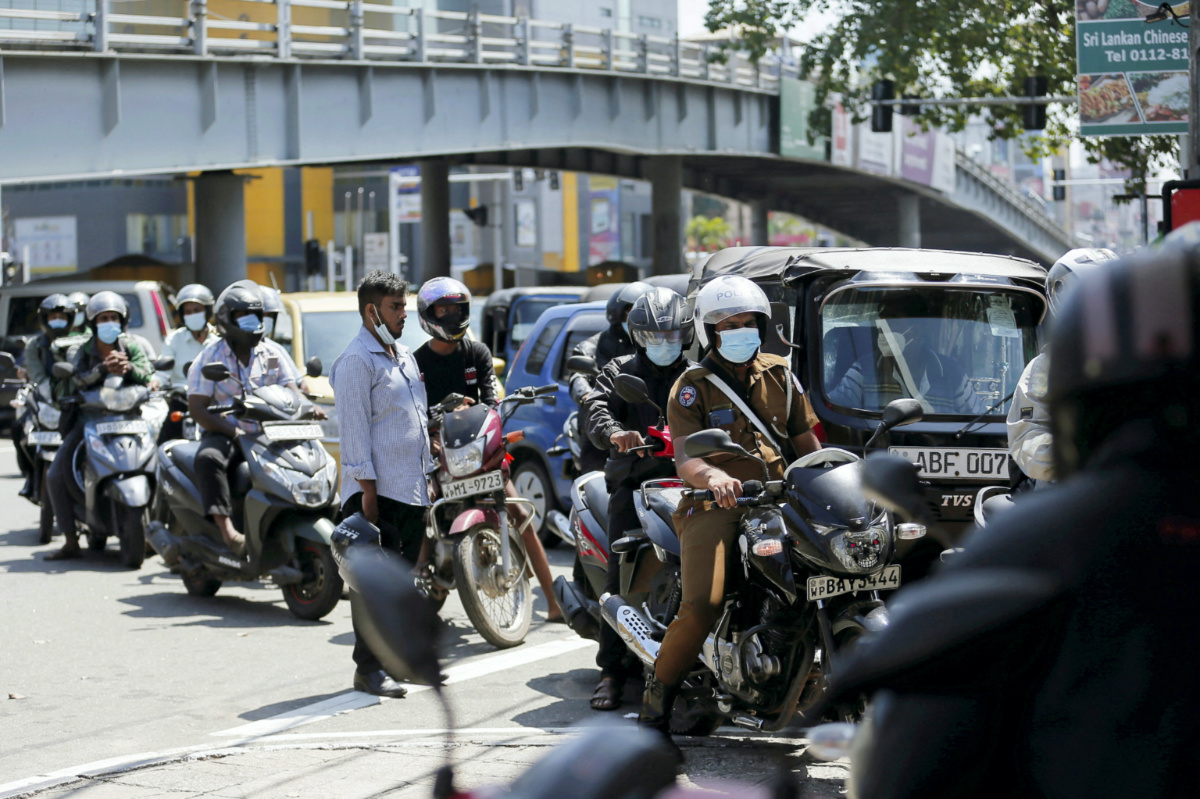Colombo, Sri Lanka
Reuters
Sri Lanka must urgently seek funds from multilateral lenders and aim to restructure a debt payment due in July, its outgoing finance minister said on Thursday, pleading for political stability amid the country’s worst economic crisis in decades.
The opposition and some partners of the ruling coalition rejected calls this week for a unity government from President Gotabaya Rajapaksa after he disbanded his cabinet, hoping to quell weeks-long street protests over shortages of fuel, power, food and medicine.

Police officers try to hold the metal barrier gates as demonstrators pull it off during a protest near Temple Trees Prime Minister Mahinda Rajapaksa’s official residence, amid the country’s economic crisis in Colombo, Sri Lanka, on 7th April. PICTURE: Reuters/Dinuka Liyanawatte.
With its foreign exchange reserves shrinking quickly, massive debt payments due and the rupee currency slumping, analysts say the government – controlled by Rajapaksa and his elder brother Mahinda, the Prime Minister – is running out of options.
Reserves dropped 16 per cent to $US1.93 billion in March, central bank data showed on Thursday.
“We must look at how to structure the $US1 billion international sovereign bond payment maturing in July,” said Ali Sabry, who submitted his resignation to Rajapaksa on Tuesday. “We must go to the IMF, there is no other solution that I can see.”
Sabry was moved to finance from the justice ministry on Monday to replace President Rajapaksa’s younger brother Basil Rajapaksa.
It was not immediately clear if Rajapaksa had accepted Sabry’s resignation, submitted days ahead of scheduled talks with the IMF for emergency loans.
As the island nation attempts to fast-track the formulation of proposals to present to the IMF President Rajapaksa on Thursday appointed KMM Siriwardana, a deputy governor at the central bank who previously worked with the Fund, as treasury secretary.
The $US1 billion bond maturing on 25th July was trading at 54 cents in the dollar, its lowest level since spring 2020 when the COVID-19 rout hit global financial markets, data from MarketAxess showed.
Other Sri Lankan dollar-denominated sovereign bonds traded at even more stressed levels, with most changing hands around 40 cents in the dollar.
“We must have political stability to find solutions to the financial crisis,” Sabry said.
“We must discuss with the World Bank and we must have a bridge-financing plan with the ADB. If we don’t have stability, who will conduct these talks?,” he said, referring to the Philippines-based Asian Development Bank.
Opposition lawmakers continued to call for the president to step down. At least 41 parliamentarians withdrew from the ruling coalition this week, though they could still support the government in the house and the opposition has not called for a no-confidence vote.
Foreign Minister GL Peiris told diplomats in a briefing that the government still held a majority in parliament and that “despite the agitation”, there was no consensus on who could replace the president, prime minister and parliament.

People wait in line to buy diesel near a Ceylon Petroleum Corporation fuel station, amid the country’s economic crisis in Colombo, Sri Lanka, on 7th April. PICTURE: Reuters/Dinuka Liyanawatte.
Deep in debt
Critics have accused the government of mismanagement, but the tourism-reliant economy has also been hit hard by the COVID-19 pandemic.
Help from the IMF would likely come with some tough political choices – policy reforms that could add to the pain in the short term in hopes of getting the economy back on more solid footing in a few years.
JP Morgan analysts estimated this week that Sri Lanka’s gross debt servicing would amount to $US7 billion this year, with the current account deficit coming in around $US3 billion.
As the search for a replacement for Sabry at the finance ministry continues, P. Nandalal Weerasinghe took over as the central bank governor, succeeding Ajith Nivard Cabraal, who quit on Monday.
A court in the commercial capital Colombo on Thursday barred Cabraal from leaving the country until March 18, Rajith Keerthi Tennakoon, a well-known anti-corruption activist who accused Cabraal of misusing public funds during his tenure, told Reuters. Tennakoon had petitioned the court.
Reuters could not immediately contact Cabraal and his lawyer did not answer calls.
Weerasinghe, a former senior central bank deputy governor who has also worked with the IMF, will hold a monetary policy meeting on Friday. It was originally scheduled to be held on Monday.
An analyst said the central bank was expected to hike key interest rates by 300-400 basis points – following a 100 bps increase in early March – to tame inflation that hit 18.7 per cent in March.
“We also expect the newly appointed governor to outline potential measures to be included in the IMF reform plan, views on potential debt restructuring, and currency management,” said Lakshini Fernando of Asia Securities.
– Additional reporting by KARIN STROHECKER in London, UK.






